No, not for Hallowe’en!
I spoke at a workshop a few weeks ago with some other historical writers, and when we asked for questions, a woman asked this:
So…you’re living in England during the Regency. You’re not Lady Something or the Hon. Miss Something-Else. You’re not even a gentleman’s daughter. You have to earn a living.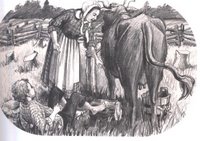
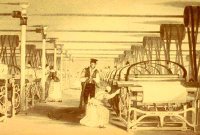 If you were born in the country, you might be able to stay there–always assuming you weren’t forced out by foreclosure–or you might seek a job in a mill or factory in one of the rapidly growing industrial cities.
If you were born in the country, you might be able to stay there–always assuming you weren’t forced out by foreclosure–or you might seek a job in a mill or factory in one of the rapidly growing industrial cities.
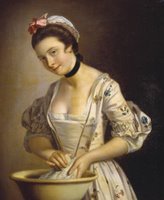
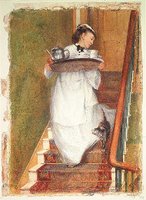 Or, you might go into service. Here’s another amazing statistic: in the eighteenth century, one-third of all the population (with the exception of the aristocracy) was in service at some time in their lives—usually until their mid-twenties. About one-third of London’s population were servants. Some people, working in the houses of the rich, rose in the ranks to enter the servant elite as butler, housekeeper, or lady’s maid; even though this illustration is from the mid-eighteenth century, you can see how well-dressed this lady’s maid is. Servants earned room and board, plus “perks”—for a ladies maid or valet, cast-off clothing they could wear or sell—or “vails,” tips from visitors usually given to footmen.
Or, you might go into service. Here’s another amazing statistic: in the eighteenth century, one-third of all the population (with the exception of the aristocracy) was in service at some time in their lives—usually until their mid-twenties. About one-third of London’s population were servants. Some people, working in the houses of the rich, rose in the ranks to enter the servant elite as butler, housekeeper, or lady’s maid; even though this illustration is from the mid-eighteenth century, you can see how well-dressed this lady’s maid is. Servants earned room and board, plus “perks”—for a ladies maid or valet, cast-off clothing they could wear or sell—or “vails,” tips from visitors usually given to footmen. 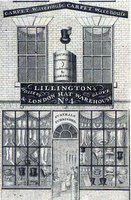 The maidservant illustration is from the mid-nineteenth century, but gives you an idea of what it was like being at the beck and call of a bell, and negotiating stairs in a long skirt, possibly carrying something worse than a tea service. Becoming a servant for a few years gave you upward mobility; hopefully you’d have saved enough to leave, marry, and own your own business—a shop, maybe—and have a servant or two of your own.
The maidservant illustration is from the mid-nineteenth century, but gives you an idea of what it was like being at the beck and call of a bell, and negotiating stairs in a long skirt, possibly carrying something worse than a tea service. Becoming a servant for a few years gave you upward mobility; hopefully you’d have saved enough to leave, marry, and own your own business—a shop, maybe—and have a servant or two of your own.
But life was uncertain and who knows where you might end up (another interesting statistic, although one I find difficult to believe: one third of the female population of London during the nineteenth century were prostitutes). You might find yourself reviewed in Harris’s List of Covent Garden Ladies, a sort of Michelin Guide to whores for the discerning gentleman.
Your best bet, really, as we told the woman smart enough to ask this interesting question, was to marry as well as you could.
So what what would you be?
Janet

I’m part Irish, so I’d probably end up as the scullery maid. But I love clothes, and am mild-mannered, so maybe the lady of the house would overlook my birth and let me attend her as her lady’s maid. Then I’d ogle the foxy footmen and hope to marry one eventually.
Hmmmmmm, based on my real life? My father would be a merchant of some kind (he’s the VP of a Fire Safety Equipment Company), with a blueblood grandfather who left him money when he died (all true to life) . . . so I’d probably be on the catch for gentleman of some sort with my newfound dowry. Basically my family would be the Lucases! LOL!
I’d like to think I’d be a Fanny Burney or Jane Austen, but who knows . . . I don’t think I’d make a very good servant (well, I’d be a pretty good groom, but as girls weren’t allowed to be grooms . . . ). Most likely I’d be teaching at some wretched school.
And if we’re going to go with my other life . . . well, I’d be roaming the Great Plains in blissful ignorance of the horror that was about to befall my kind.
another interesting statistic, although one I find difficult to believe: one third of the female population of London during the nineteenth century were prostitutes
I haven’t seen a figure quite that high before — I think one out of eight was the highest I’ve seen — but figures this high are only arrived at by using the Victorian definition of prostitute: any woman who ever slept with a man she wasn’t at that moment married to.
Victorian London also had a lot of women who were not what we would call career prostitutes: mostly working mothers, who when they occasionally ran short of money before the end of the week and needed food for the kids, might turn a trick or two to make up the shortfall.
As to what I’d be? A stout German nun, I suspect. 🙂
Cara
(who knows way more than she needs to about certain subjects)
Nun? Cara, you? No way!! 🙂
I’d probably be part of the country folk living in genteel poverty. No, not the kind where you and your animals cohabited, but the kind where you had a cottage, a parcel of land where you grew your vegetables, a cow for milking, chickens and ducks for eggs and the occasional tasty meal, and pig or two (??). We would have a housekeeper / general dogsbody who came in the morning and left in the evening. I wouldn’t be a woman of leisure, of course, but I do see myself as a writer: short stories, articles, letters, that sort of thing.
I’m seeing a passel o’ kids. Husband?? Don’t know what he’d be doing. Any suggestions?
(Please let him have all his hair and teeth and working body parts.)
Hmm. I’ve no illusions whatsoever of aristocratic blood, and I’m from a blue collar background, so I know my Regency alter ego wouldn’t have danced at Almack’s. My family has something of a military tradition and I write Peninsular War stories, so I’ll say that instead of being a servant, Regency Susan would’ve married a soldier, followed the drum, and possible gone through several husbands along the way.
Answering my own question–I know what my maternal grandmother’s side of the family was doing at the time–quietly inbreeding as farmers in Bromley, Kent. I like to think of myself as a prosperous farmer’s wife, with a brand new pianoforte in the parlor that I mean to learn to play one day and aspirations to gentility. The sort of uppity countrywoman that Cobbett ranted about, who preferred to slop around cooking potatoes rather than getting herself up to her elbows in wholesome bread dough.
My ancestors’ surname was Westbrook, the same as Shelley’s unfortunate first wife Harriet, who drowned herself in 1816 . Possibly she was a relative, although from a more upscale branch of the family–her father owned a coffeehouse in Grosvenor Square.
Janet
Well, my ancestors were Lithuanian farmers, so maybe that’s what I’d be, without, I suspect, the pretensions to gentility Janet mentions.
OTOH I love to sew and embroider (in contrast to proper Regency heroines, who are often spirited types who abhor needlework). So maybe I’d work in some modiste’s shop. Dare I hope some rake would come with his mistress to buy her some things, she’d throw a temper tantrum and I’d catch his eye instead? Being the kept woman of a goodlooking and wealthy man might not be too awful. I’d keep his shirts mended, too.
I’m sure I was a scullery maid, probably why washing dishes is one chore I don’t really mind.
My ancestors on both sides came from Alscace Loraine, that part of France that switched from France to Germany and back.
My great great grandfather brought his whole family over to the US when my great grand mother was a baby. There was a terrible storm at sea and he promised the Virgin Mary that he would build a chapel in her honor if she would deliver his family safely from the storm. She did and he did too. There is a chapel near Buffalo NY, still there, that he built.
Would you believe I’ve never been there? I was an adult before I ever heard the story.
What this has to do with the question, I’m not really sure…..
I didn’t think my post saved — the darn browser decided to crash while I was waiting for it to login. Oh well. Anyway, I had said that if I was anything like I am today back then, I’d be in some serious trouble. . .
I can’t cook, and they didn’t have microwaves. ..
I can’t sew, although I still have my cute little pin cusion from one quarter of home ec back in 1990 freshman year. . .
I do like ironing, but alas, they didn’t have irons like QVC does. . .
I would never go near a farm animal. . .
so I’m pretty much in a mess. Well, I guess I could always try for governess, but do they really need one with a distinct leaning towards astronomy? LOL 🙂
Lois
LOL! I would probably be some embittered governess, like Jane Fairfax. 🙂 (I’m still having fun imagining Cara as a nun, though…)
Right after reading the blog, I thought maybe I’d like to be a governess who hopefully catches the eye of her employer, who just happens to be widowed, young, rich, handsome & a Duke. *g*
But after reading the other comments and seeing how people were tying this into their real life, I no longer knew what I’d be. Did any Filipinos ever make it over to England during the Regency period? I guess I would be considered exotically different, and become the aforementioned Duke’s mistress. LOL!
Nothing surprising about being a nun — my German nun is the 18th century version of the modern career woman. Instead of taking care of house and children and husband, she got to do stuff. Mine would have been a scholarly woman, studying medieval manuscripts that her order has, and trying to figure out how medieval Latin got so weird and decadent as it decayed from classical Latin!
Cara 🙂
Hmm. Since I had a severe ear infection as an infant, the odds are good that if I had lived 200 years ago I’d be dead. I love history, but that sobering fact is enough to make me glad that I was born in an era with antibiotics.
However, assuming that I made it to adulthood, and projecting my family back 200 years, I’d probably be a clergyman–assuming we weren’t too poor for me to get an education. (My family has had lots of clergy for generations, though a couple of us became heathen scientists like me.) Since our family is not rich or well-connected, I’d more likely be a curate–or perhaps a dissenting minister. 🙂
Todd-who-wonders-if-curates-could-be-pen-pals-with-German-nuns
Well…I’d probably be either an indentured servant or a slave. Not very fun for me. *G*
Shay